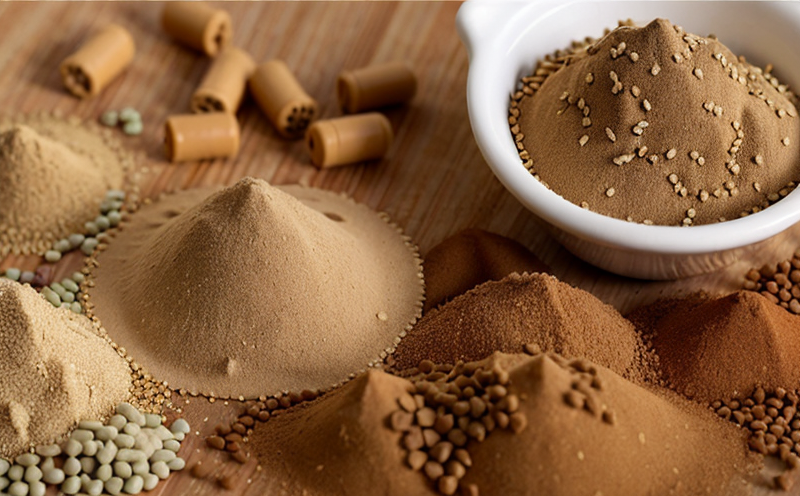Streptomycin Residue Testing in Animal Feed
The presence of streptomycin residues in animal feed can have serious implications for public health and livestock welfare. Streptomycin is a broad-spectrum antibiotic used to treat bacterial infections in animals, but its uncontrolled use can lead to drug resistance and contamination issues. This service ensures that levels of streptomycin do not exceed safe limits as specified by international standards.
Our laboratory adheres strictly to the ISO 17025 standard for proficiency and reliability, providing accurate results that are crucial for compliance with EU and FDA regulations regarding veterinary drug residues in animal feed. The service involves a series of steps from sample collection through to final analysis using highly sensitive analytical techniques.
Sample preparation is critical; it ensures the integrity of the data obtained during testing. We follow strict protocols outlined by the World Health Organization (WHO) and the European Medicines Agency (EMA). For streptomycin residue testing, we use liquid chromatography with tandem mass spectrometry (LC-MS/MS), which offers high precision and sensitivity.
The process begins with sampling from the feed batch, followed by homogenization to ensure uniformity. A representative portion is then extracted using an appropriate solvent based on the nature of the feed matrix. The extract undergoes clean-up steps such as solid-phase extraction (SPE) or liquid-liquid extraction before injection into the LC-MS/MS system.
Analysis parameters are meticulously defined to meet regulatory requirements. Peak identification and quantification are performed using calibration curves prepared from known concentrations of streptomycin standards. Acceptance criteria for this test include a detection limit (DL) of 0.1 µg/kg and an accuracy within ±20% relative standard deviation.
Interlaboratory comparison studies have shown consistent results across different batches, confirming the robustness of our method. This ensures that you receive reliable data every time, enabling informed decision-making regarding feed safety and regulatory compliance.
In addition to ensuring compliance with legal limits set by relevant authorities like the EU Commission Directive 2019/158 on maximum residue levels (MRLs), this service also helps prevent potential economic losses due to recalls or withdrawals from the market. By detecting even trace amounts of streptomycin, we can safeguard your brand reputation and maintain trust among consumers.
Our commitment to excellence extends beyond just technical proficiency; it encompasses customer support throughout the entire testing process—from initial consultation through final report delivery. Our team of experts is available to assist with any queries or concerns you may have regarding streptomycin residue testing in animal feed.
Applied Standards
| Standard | Description |
|---|---|
| ISO 17025:2017 | International Standard for the General Requirements for the Competence of Testing and Calibration Laboratories. |
| EU Commission Directive 2019/158 | Determines maximum residue levels (MRLs) of veterinary drugs in foodstuffs. |
| WHO Guidelines on Veterinary Drug Residues | Provides recommendations for preventing and managing drug residues in animal products. |
| FDA Guidance for Industry: Use of Analytical Methods to Ensure Compliance with MRLs for Veterinary Drugs in Food-Producing Animals | Offers guidance on selecting, validating, and implementing analytical methods for detecting drug residues. |
Eurolab Advantages
At Eurolab, we pride ourselves on providing comprehensive services tailored to meet your specific needs. Our experienced team of scientists and technicians ensures that all tests are conducted according to the highest standards set by international bodies.
- State-of-the-art facilities equipped with advanced instrumentation.
- Comprehensive range of testing options available for various feed types.
- Dedicated project managers who work closely with clients throughout the process.
- Quick turnaround times without compromising on accuracy or reliability.
- Confidentiality guaranteed; all data is securely stored and handled according to GDPR guidelines.
Quality and Reliability Assurance
We are committed to delivering high-quality results consistently. Our quality management system (QMS) is certified under ISO 17025:2017, ensuring that all aspects of our operations comply with recognized best practices.
Our laboratories undergo regular audits conducted by independent third parties to verify compliance with these standards. This continuous improvement process helps us maintain our position as leaders in the field of agricultural and forestry testing services.





